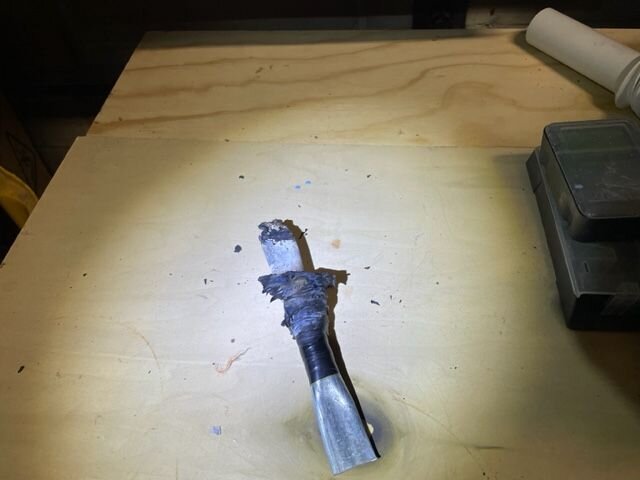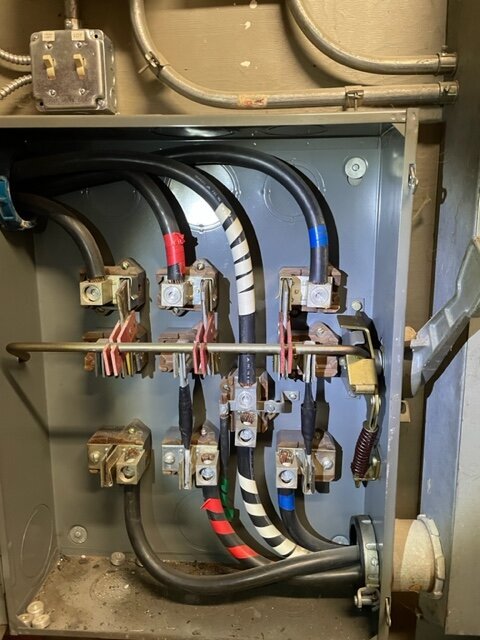Good Grief, what could have been! We were noticing some flickering in our work lights and the AC units were working kind of funcky. Noticing that some lights were OK and others not, I figured "maybe we've lost a phase". Since we moved into and renovated this old bus garage 13 years ago, we never had cause to open the main input switch box. I mean, who wants to get cozy to 3 phase 400 amps? So I opened it and found this!! Someone had flattened the ends of some conduit and put it in place of fuses. And you'll notice I was able to open the panel without turning everything off because the switch blades only went part way into their slots so the lock wasn't engaged. What mind thinks that was an OK thing to do?
You are using an out of date browser. It may not display this or other websites correctly.
You should upgrade or use an alternative browser.
You should upgrade or use an alternative browser.
How could you think this was right?!
- Thread starterdbaxter
- Start date
JonCarter
Well-Known Member
Well, apparently in at least those 13 years no one overloaded anything badly enough melt any wiring. You're lucky. I've seen pieces of 1/2" copper pipe and scraps of old bus bars in fuse clips. Get yourself some rubber gloves, turn off all your loads clean the fuse clips and put in a set of he proper size new fuses. If when you turn things back on, you blow one or more fuses you need to get somebody to look at things & find what's overloading..
Oh, it's all fixed and proper now. Learned a 400 amp fuse is the size of a frozen juice can.Well, apparently in at least those 13 years no one overloaded anything badly enough melt any wiring. You're lucky. I've seen pieces of 1/2" copper pipe and scraps of old bus bars in fuse clips. Get yourself some rubber gloves, turn off all your loads clean the fuse clips and put in a set of he proper size new fuses. If when you turn things back on, you blow one or more fuses you need to get somebody to look at things & find what's overloading..
jtweigandt
Well-Known Member
400 Amps? To my eye, those wires are not big enough for 400 Amps. What is the wire size? 400 Amps might be the rating of the switch, but the fuse size is determined by the ampacity of the wire. Fuses over rated for the wire is dangerous.
I hope the fuse and switch contacts were carefully inspected. Any pitting, burning or discoloration should condemn that box.
Last edited:
Yeah, looks like 3 gauge to me, and hey, they wrapped the middle with friction tape, I'm sure it's fine....400 Amps? To my eye, those wires are not big enough for 400 Amps. What is the wire size? 400 Amps might be the rating of the switch, but the fuse size is determined by the ampacity of the wire. Fuses over rated for the wire is dangerous.
I hope the fuse and switch contacts were carefully inspected. Any pitting, burning or discoloration should condemn that box.
We were noticing some flickering in our work lights and the AC units were working kind of funcky. Noticing that some lights were OK and others not, I figured "maybe we've lost a phase". Since we moved into and renovated this old bus garage 13 years ago, we never had cause to open the main input switch box.
Now, NO, I'm NOT saying what was done 13+ years ago was in any way correct, but...I'd be highly surprised if installing the proper fuses alleviates your problems of flickering work lights and flaky HVAC. Might have been interesting to look at the connections with one of them fancy thermal imaging cameras. Random example by Fluke: https://www.amazon.com/dp/B011E2VVW8/?tag=controlbooth-20 . I wonder if they're available to rent?
I suspect the flickering lights is a poor termination at a service panel. An industrial electrician should be consulted.
We have a bad neutral termination at the dimmer vault in my local PAC. You can hear it in the audio in the Concert Hall sound system and in the Telex intercoms as lights are dimmed. I've pointed this out to facility management and get blank stares. When it finally burns up I'll be able to say "I told you so." From the safety of my retirement.
We have a bad neutral termination at the dimmer vault in my local PAC. You can hear it in the audio in the Concert Hall sound system and in the Telex intercoms as lights are dimmed. I've pointed this out to facility management and get blank stares. When it finally burns up I'll be able to say "I told you so." From the safety of my retirement.
I saw an install at my work place many years ago when they were so-called “upgrading” the service entrance panel, they uppped us from a 400 amp service for stage AND house lighting, to a new 800 for stage lighting. The install electrician had to run new feeders to the ConEd vault on the street and ran single 500,000 cable, not double as he should have. I called him on it and he responded “from the SE out, it’s ConEds problem, let them fix it”. 20 years later on a subsequent additional upgrade I reminded the new electrical engineer of the underfed service. He inspected and had them replace the entire SE wiring.
Let me put everyone's mind at ease - the electrician we used to put in the fuses is a union, licensed electrician. He used fine emory cloth to remove what ever crud was on all the contacts. I fired up all the lights for him and we measured 106 amps at full bright. It did vary a bit between phases, but at acceptable levels. The current level will even drop in the year to come as more LEDs replace the existing instruments. I think the AC units are running better than before, but that might be just a placebo effect.
You're probably already addressing this, but I feel like I have to say it for anyone who looks at this later. If you've found that.....what haven't you found?
Time to get that bonded, insured, licensed, certified electrician in to check everything.
@dbaxter has been using this system long enough to know what other problems they've fixed. I shudder to think what other houses are dealing with, with someone paying less attention.
Time to get that bonded, insured, licensed, certified electrician in to check everything.
@dbaxter has been using this system long enough to know what other problems they've fixed. I shudder to think what other houses are dealing with, with someone paying less attention.
Similar threads
- Replies
- 3
- Views
- 1K
- Replies
- 0
- Views
- 893
- Replies
- 1
- Views
- 1K
Users who are viewing this thread
Total: 1 (members: 0, guests: 1)




